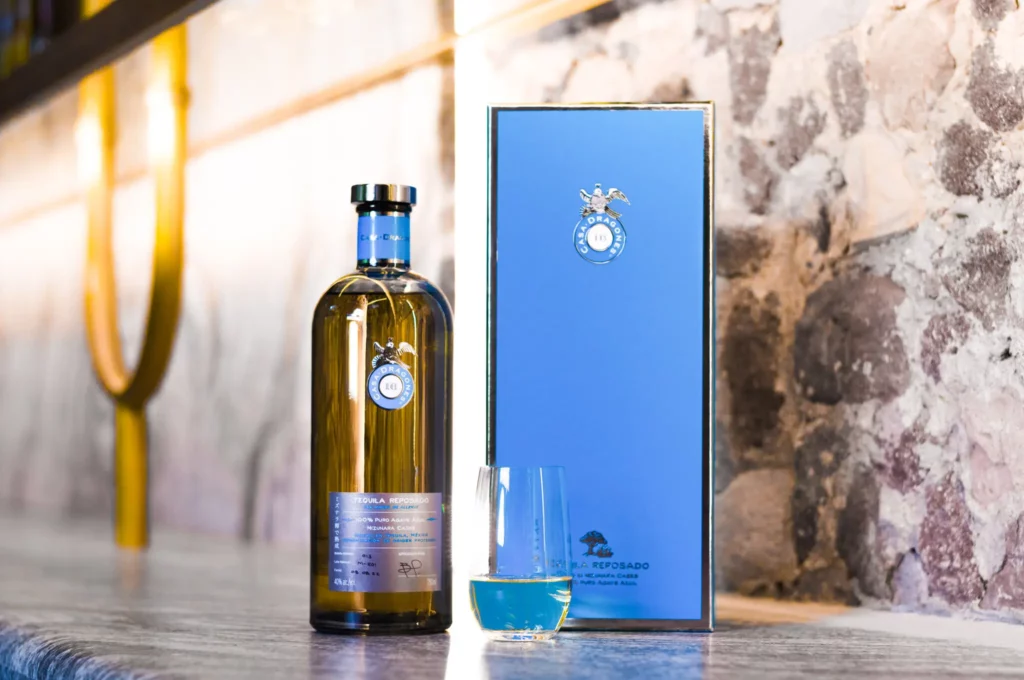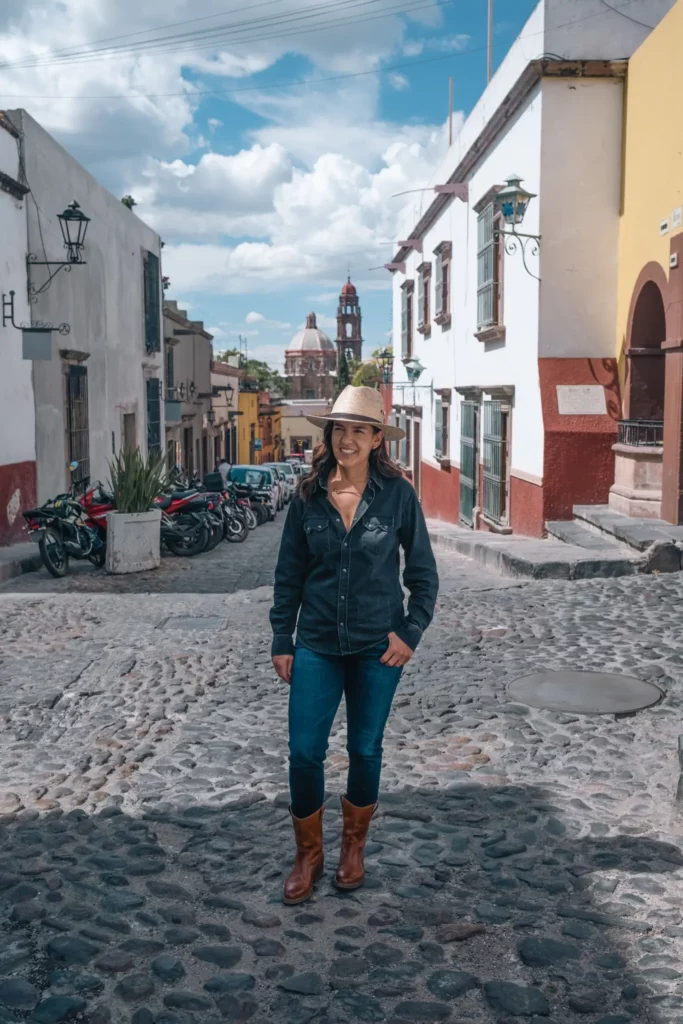Bertha González Nieves, Mexico’s first official maestra tequilera — or female master distiller — talked as she poured.
“Did you know that oysters pair really beautifully with tequila?” she asked. The co-founder and chief executive of Casa Dragones was sitting in her Chelsea apartment on an afternoon in August, wearing a kelly-green blazer that offset her gold jewelry, offering a tasting of her company’s various tequilas.
The minerality of the mollusk, she explained, accents the light citrus present in un-aged tequila such as a blanco, or a joven, which is a blend of un-aged and aged tequilas. Ceviche, grilled octopus, sea urchin — all are excellent to have with tequila. Dark chocolate works well, too. “But the harder you go on the cacao,” she said, “the more you’re going to get from the oak,” referring to the flavors of an añejo, or a tequila that has been aged for one to three years in oak barrels.
Ms. González Nieves, 52, started Casa Dragones in 2009 with Bob Pittman, 68, the chairman and chief executive of iHeart Media, after tequila shed its persona in the United States as a rough-and-tumble party liquor. What was once a drink that college students downed at bars with a dash of salt and slice of lime, or mixed to make sickly sweet margaritas, is now ordered neat or on the rocks, sipped not shot.
Today, the spirit has become yet another status beverage that is name-checked in numerous rap songs, consumed by Birkin-bag-toting reality television stars and listed on celebrity riders. Made exclusively from the blue agave plant grown in the Mexican state of Jalisco, tequila is also celebrated for its agavins, low calories and lack of gluten. According to the Distilled Spirits Council of the United States, sales of tequila and mezcal account for almost one third of the total increase in spirits revenue last year.
But as the market has been flooded with new labels hungry to cash in — hoping to follow in the footsteps of celebrity-backed tequila brands such as those from George Clooney, Nick Jonas and Kendall Jenner — the liquor has also come to be valued for its authenticity and innovation, as seen with independent brands and makers such as Casa Dragones, which prioritizes working directly with Mexican craftspeople, chefs and bartenders and who prefer artist collaborations (such as its special edition bottle designed by Gabriel Orozco, in honor of the Mexican artist’s 2011 mid-career MoMA retrospective) over celebrity endorsements.
“Tequila’s strength became our weakness, you know?” Ms. González Nieves said. “There’s an energy to tequila because it comes from the agave plant. So many people always tell me that they don’t drink tequila anymore because they have a bad memory.”
She took a delicate sip of Casa Dragones’s newest tequila launching this month, a reposado that has been rested in Mizunara oak barrels, which are made from 200-year-old trees found in Hokkaido, Japan, and traditionally used for Japanese whiskey and other brown spirits. Last week, she attended the Judd Foundation’s Benefit in Marfa, Texas, where Casa Dragones served its reposado to celebrate, with the Mexican chef Enrique Olvera flying in to cook an elaborate family-style meal that included chochoyotas de yuca, huitlachoche and grilled peaches, among other dishes.

“The best wine in the world is considered to be Domaine de la Romanée-Conti,” said Eric Ripert, 57, who serves Casa Dragones at his restaurant Le Bernardin and remembers when the only high-end tequila customers could order was Patrón in the early 2000s. “It’s in Burgundy. It’s a very small vineyard, but the entire planet goes crazy for that wine, it’s almost unavailable. But when you meet the owner of that vineyard, he is, as we say in French, ‘a connoisseur.’ Very noble. Bertha reminds me of him in that aspect. If you have style and knowledge and you appreciate good things, you’re going to create something that you like and that’s exactly what she does.”
“With tequila,” she said, “there is actually so much sophistication. It’s an extraordinary plant. It has power. In Latin, agave means illustrious, admirable and noble. When you’re standing there in this ocean of blue and green agave, I find it very inspiring.”
Ms. González Nieves drinks tequila with her childhood in mind. She was raised in an upper-middle class family in Mexico City’s neighborhood of Pedregal de San Angel. Her father and his brother operated a cosmetics company called De Vissy International that they founded with their father; her mother ran a small catering business. Every Monday, her maternal grandmother hosted a family lunch from her home in Colonia del Valle, cooking dishes like chiles en nogadas or mole. Tequila was poured at the start of every meal. When Ms. González Nieves was 13, she persuaded her grandmother to let her try a glass ( “It was just a sip!” she said) and while she was too young to enjoy the spirit, she remembered it was imbued with a sense of meaning.
“It was a ritual,” she said. “It was part of our family’s social fabric.”
At an early age, Ms. González Nieves showed entrepreneurial spirit. At 10, on a family trip to Texas, she persuaded her mother to let her buy hundreds of dollars worth of items from the Hello Kitty store, and to resell them to her classmates back home. As a teenager, she concocted schemes to sell Balinese baskets filled with wine and poinsettias from Xochimilco to her neighbors, turning a small profit. At 17, she endeavored to become the next Hallmark Cards of Mexico, hiring an illustrator and printing cards with a friend. “It provided me with a certain independence that I really enjoyed,” she said of the money earned.
It wasn’t until Ms. González Nieves was 23, still a student at Universidad Anáhuac, that her fascination with tequila took root professionally. She had just won a scholarship with Ship for World Youth to promote Mexican culture in Japan. The program required its participants to tour various parts of Mexico in order to better understand the country for themselves. It was then, visiting the tequila fields in Jalisco, that she knew she had found her calling. Seeing tequila through the eyes of another country revealed everything that she loved about her own. She decided to find a way to work in the industry. After a stint working as a consultant for Booz Allen Hamilton and receiving her graduate business degree from Northwestern University, she was hired by Grupo Cuervo, the Mexican family company of Jose Cuervo tequilas.
There, she quickly climbed the corporate ladder, working as Grupo Cuervo’s global brand director and global director of innovation and new business. “I used to joke I had to grow a mustache,” she said of her time working in spirits, which is still a male-dominated industry. In 2000, she moved to New York City. But after eight years, she wanted something to call her own.
“She kept saying over and over again, ‘I want to be an entrepreneur,’” said her wife, Mishele Wells, who ran a communications agency called Mouth that folded into Casa Dragones in 2018. “And I would say, ‘OK, go find something.’”

Ms. González Nieves tried — “with my two pesos,” she said — investing in a Mexican magazine called Revista DF. She helped produce a Mexican comedy called “Matando Cabos” in 2004. But she sensed she was drifting out of the lane she knew best, which was tequila.
Then at a friend’s anniversary party in 2007 in Brooklyn, she met Mr. Pittman. He mentioned his house in San Miguel Allende and his interest in starting a tequila company.
Mr. Pittman sensed an opportunity. “There was a bootleg tequila that ran around town that the expats liked because it was so smooth, it didn’t have the wince factor that you normally associate with tequila,” he said. “And I remember thinking that’s an interesting idea, whoever thought tequila would be so smooth and tasty? But I didn’t know anyone in spirits. When I met Bertha I said, ‘This is fate. Come be my partner. I have a great idea.’ And you know, she had to take a leap of faith — she was giving up her career for what was really just an idea. What added more uncertainty was that we decided we were not going to build this tequila on marketing. If we couldn’t do that, we would call it quits. We wanted to build our business on a differentiated product, not a better marketing campaign, which is what most people have done with tequila.”
Casa Dragones started two years later with a premium joven. Ms. González Nieves had approached Benjamin Garcia, a maestro tequilero whom she had known during her time at Cuervo, asking him to come out of retirement to make it. The name was inspired by a former property of Pittman’s in San Miguel de Allende, which was originally the stables for the Dragones cavalry, led by Ignacio Allende, one of the original leaders in the fight for Mexican Independence. Only 1,000 cases (or 12,000 bottles) were produced, and it took Casa Dragones one and a half years for them to sell. It was meant to be a sipping tequila. A bottle today — made of crystal, designed in the manner of old apothecary vessels and hand engraved by Mexican artisans using a centuries-old craft known as pepita — costs close to $300. This was not a tequila for everyone, but that was the point. It was a tequila to celebrate the finest Mexico could offer.
With that targeted strategy in mind, though, there were skeptics in the industry.
“To be honest, the first time I heard about Casa Dragones, I was like, ‘What’s this tequila in a perfume bottle?” said Ivy Mix, 37, the author of “Spirits of Latin America” and a co-owner of the Brooklyn cocktail bar Leyenda and the wine and spirit shop Fiasco! “I don’t want anything to do with it. This is fake tequila. I always have my hairs up. So many celebrities launch tequilas and they rarely care about the culture. Then I tried it, and it was actually good, which, honestly, I was surprised, because so frequently you get these tequila brands that spend so much time and energy on their packaging, that what’s in the bottle tends not to taste that great.”
Though the brand has introduced carefully cultivated collaborations, such as one with the Danish artist Danh Võ at the 2015 Venice Biennale or another with the Mexican artists Jose Dávila and José Noé Suro, it was inevitable that celebrities — including Olivia Wilde, Ryan Seacrest and Kate Upton — would also become acolytes. Oprah Winfrey named Casa Dragones her favorite tequila in 2017.
“Casa Dragones is more with the way also many of us drink tequila,” said the artist Mr. Orozco, 60, who sips tequila every day when he is in Mexico. “You sit with it, you are in a moment of relaxed, good conversation. It goes very well with Mexican food but also with other food. The tequila is very refined, so it’s very healthy and you don’t have a horrible hangover the day after with a tattoo on your face.”
“I introduced Casa Dragones in my little town of Seal Harbor, Maine,” said Martha Stewart. “Everybody up there drinks it up since they had it at my house.” Ms. Stewart, 81, remembered when, decades ago, she first visited Marfa, Tex., and came upon a tequila bar, which seemed like a novelty at the time. “Now, when I ask for a glass of Casa Dragones,” she said, “no matter where I go, it’s there.”



















Comments